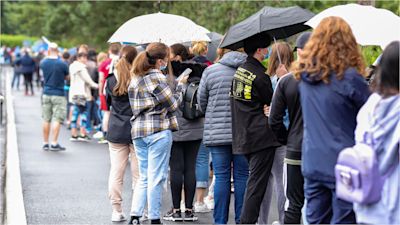Queues at vaccine centres as children in Ireland receive jabs

Queues formed at vaccine centres in Ireland as children aged 12 to 15 received their first Covid-19 jabs.
About 75,000 children in the age group had registered for a vaccine appointment by Saturday, 48 hours after the online portal opened to the cohort.
A number of centres administered vaccines to 12 to 15-year-olds on Friday but the main rollout began in earnest on Saturday.
Ireland's HSE chief executive Paul Reid said the opening of the vaccine to 12- to 15-year-olds marks a “very strong point” of the vaccine programme.
He said: “Many of those who will have registered yesterday will have already received appointments for this weekend, I’m very happy to say that.
“Our teams and vaccination centres are strongly focused to try and get this job done rapidly and quickly.”
In the UK, all 16- and 17-year-olds are being invited to get a Covid jab.
It comes as government scientific adviser said older teenagers have been becoming “seriously ill” from coronavirus.
More than 75% of all adults in the UK are now fuly vaccinated and 89% having had at least their first jab.
The rate of new cases is rising in all four nations, suggesting the sharp fall in Covid-19 cases that had been under way since July 17 has now come to an end.
Daily cases remained above 30,000 for the second day on Friday. There were 32,700 new cases reported on Friday, following 33,074 new infections recorded on Thursday.
Coronavirus: What you need to know -
Cases had fallen as low as 21,691 last week following a high of 54,674 in mid-July, but hopes of the pandemic subsiding appear to have been dashed by the latest figures.
Meanwhile, 100 more people have died in the UK after testing positive for coronavirus.
Dr Simon Clarke, associate professor in cellular microbiology at the University of Reading, said while vaccines are reducing the number of hospital admissions and deaths, high case numbers "still place an unnecessary burden on the NHS".
With infection prevalence in England at around 25 times higher than the same time last year, Dr Clarke said the current situation is "an early sense of what living with Covid-19 looks like".